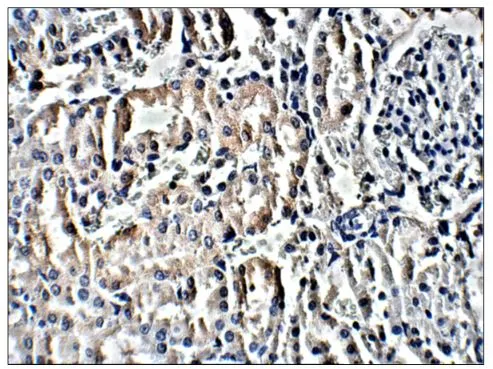![WB analysis of various cell lines using GTX83792 PROM2 antibody [14D1]. Loading : 35 ug per lane Dilution : 1:200 WB analysis of various cell lines using GTX83792 PROM2 antibody [14D1]. Loading : 35 ug per lane Dilution : 1:200](https://www.genetex.com/upload/website/prouct_img/normal/GTX83792/GTX83792_3454_WB_w_23061420_298.webp)
WB analysis of various cell lines using GTX83792 PROM2 antibody [14D1]. Loading : 35 ug per lane Dilution : 1:200
PROM2 antibody [14D1]
GTX83792
ApplicationsImmunoFluorescence, Western Blot, ImmunoCytoChemistry, ImmunoHistoChemistry, ImmunoHistoChemistry Paraffin
Product group Antibodies
ReactivityHuman, Monkey, Mouse
TargetPROM2
Overview
- SupplierGeneTex
- Product NamePROM2 antibody [14D1]
- Delivery Days Customer9
- Application Supplier NoteWB: 1:2500-1:5000. ICC/IF: 1:100. IHC-P: 1:50. *Optimal dilutions/concentrations should be determined by the researcher.Not tested in other applications.
- ApplicationsImmunoFluorescence, Western Blot, ImmunoCytoChemistry, ImmunoHistoChemistry, ImmunoHistoChemistry Paraffin
- CertificationResearch Use Only
- ClonalityMonoclonal
- Clone ID14D1
- Concentration0.8 mg/ml
- ConjugateUnconjugated
- Gene ID150696
- Target namePROM2
- Target descriptionprominin 2
- Target synonymsPROML2, prominin-2, prominin-like protein 2, prominin-related protein
- HostMouse
- IsotypeIgG1
- Protein IDQ8N271
- Protein NameProminin-2
- Scientific DescriptionThis gene encodes a member of the prominin family of pentaspan membrane glycoproteins. The encoded protein localizes to basal epithelial cells and may be involved in the organization of plasma membrane microdomains. Alternative splicing results in multiple transcript variants. [provided by RefSeq]
- ReactivityHuman, Monkey, Mouse
- Storage Instruction-20°C or -80°C,2°C to 8°C
- UNSPSC41116161
References
- Sex Differences in Diabetes- and TGF-beta1-Induced Renal Damage. Ziller N et al., 2020 Oct 3, CellsRead this paper

![IHC-P analysis of liver carcinoma tissue using GTX83792 PROM2 antibody [14D1]. Antigen retrieval : Heat-induced epitope retrieval by 10mM citrate buffer, pH6.0, 100oC for 10min. Dilution : 1:50 IHC-P analysis of liver carcinoma tissue using GTX83792 PROM2 antibody [14D1]. Antigen retrieval : Heat-induced epitope retrieval by 10mM citrate buffer, pH6.0, 100oC for 10min. Dilution : 1:50](https://www.genetex.com/upload/website/prouct_img/normal/GTX83792/GTX83792_1833_IHC-P_w_23061420_725.webp)
![ICC/IF analysis of COS7 cells using GTX83792 PROM2 antibody [14D1]. ICC/IF analysis of COS7 cells using GTX83792 PROM2 antibody [14D1].](https://www.genetex.com/upload/website/prouct_img/normal/GTX83792/GTX83792_655_ICCIF_w_23061420_137.webp)
![ICC/IF analysis of COS7 cells transiently transfected with PROM2 plasmid using GTX83792 PROM2 antibody [14D1]. ICC/IF analysis of COS7 cells transiently transfected with PROM2 plasmid using GTX83792 PROM2 antibody [14D1].](https://www.genetex.com/upload/website/prouct_img/normal/GTX83792/GTX83792_820_ICCIF_w_23061420_384.webp)
![WB analysis of HEK293T cells transfected with PROM2 plasmid (Right) or empty vector (Left) for 48 hrs using GTX83792 PROM2 antibody [14D1]. Loading : 5 ug per lane WB analysis of HEK293T cells transfected with PROM2 plasmid (Right) or empty vector (Left) for 48 hrs using GTX83792 PROM2 antibody [14D1]. Loading : 5 ug per lane](https://www.genetex.com/upload/website/prouct_img/normal/GTX83792/GTX83792_3910_WB_w_23061420_477.webp)


![WB analysis of HepG2 cell lysate using GTX83794 PROM2 antibody [3D12]. Loading : 35 ug per lane](https://www.genetex.com/upload/website/prouct_img/normal/GTX83794/GTX83794_3914_WB_w_23061420_154.webp)
![WB analysis of various cell lines using GTX83797 PROM2 antibody [5E5]. Loading : 10 ug per lane Dilution : 1:200](https://www.genetex.com/upload/website/prouct_img/normal/GTX83797/GTX83797_3455_WB_w_23061420_222.webp)
